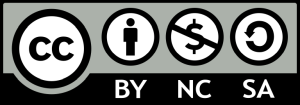Authors' Rights
Authors continue to hold copyright with no restrictions. Based on its copyright Journal of NeuroPhilosophy (JNphi) produces the final paper in JNphi’s layout. This version is given to the public (and also back to the authors) under the Creative Commons license (CC BY). For this reason authors may also publish the final paper in any repository or on any website with a complete citation of the paper.
Based on its copyright JNphi produces the final paper of JNphi’s layout. This version is given to the public under the Creative Commons license (CC BY ). For this reason authors may also publish the final paper in any repository or on any website with a complete citation of the paper. Open Access to peer-reviewed research literature means:
"...its free availability on the public internet, permitting any users to read, download, copy, distribute, print, search, or link to the full texts of these articles, crawl them for indexing, pass them as data to software, or use them for any other lawful purpose, without financial, legal, or technical barriers other than those inseparable from gaining access to the internet itself. The only constraint on reproduction and distribution, and the only role for copyright in this domain, should be to give authors control over the integrity of their work and the right to be properly acknowledged and cited." The reuse rights from this declaration can be described with the Creative Commons license "Attribution" (CC BY)

Creative Commons Licenses were a successful venture into allowing authors to retain copyright, and allow for publication of their work through licenses that allow for reuse. ATTRIBUTION: CC BY; This license lets others distribute, remix, adapt, and build upon your work, even commercially, as long as they credit you for the original creation. This is the most accommodating of licenses offered. Recommended for maximum dissemination and use of licensed materials.
Benefits of open access: Publishing open access offers a number of benefits, including greater reach and readership for your work:
Cited more: 1.6x more citations of OA articles than non-OA articles across all subjects
Downloaded more: 4x more downloads of OA articles than non-OA articles
Greater impact: 2.5x more Altmetric attention. OA articles attracted 1.9x more news mentions and 1.2x more policy mentions
φ Prepare your paper for submission
Download our get published quick guide, which outlines the essential steps in preparing a paper.
φ Submit and revise
You can submit to JNphi using our online systems.
φ Track your submitted paper
You can track the status of your submitted paper online. The system you use to track your submission will be the same system to which you submitted.
φ Track your accepted paper
Once your paper is accepted for publication, you will receive a mail and a direct link that lets you follow its publication status
φ Share and promote
Now that your article is published, you can promote it to achieve a bigger impact for your research.
![]()
















